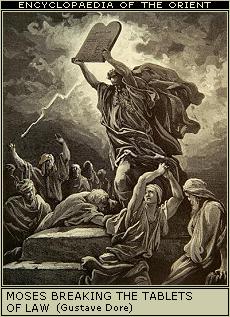
So titled this MoJo piece about Jack Abramoff.
"To Marshall Wittmann, a former Christian conservative who now works for the moderate Democratic Leadership Council, the story of Jack Abramoff is the story of a generation. 'It's a classic tale of intending to do good -- and doing very well,' he says. 'The pledge of all these Reagan revolutionaries was to overturn the iron triangle of Congress, the special interests, and the lobbyists. Instead, they've found themselves comfortable with big government, as long as it cashes in for their clients. I remember all these people as insurgents, revolutionaries to overthrow the establishment. They became the establishment in such a short time in an orgy of moneymaking. They ran the Republican revolution off the rails.'"
**
That's if you buy that it was a "fall." Alternately, you could go with the simpler theory:
"'I don't think Abramoff ever stood for anything,' says Melanie Sloan, executive director of Citizens for Responsibility and Ethics in Washington. 'I think Abramoff just stands for greed. I think Abramoff is a terrible human being and should get anything coming his way.'"
***
I was inclined to go with the latter explanation. And yet I'm reading this and it does seem that Abramoff was some sort of zealot. Starting as a lad.
"IN THE HEAT OF A LOS ANGELES summer afternoon, the 13-year-old set off from home and began walking the five miles to synagogue. He was hungry and thirsty. It was the Jewish holy day of Tisha B'Av, when observers are not allowed to consume food or water for 24 hours. Grasping for his own interpretation of the law, the boy had convinced himself that he wasn't supposed to ride in a car or even wear shoes.
He walked along the fence of the Los Angeles Country Club, an institution that historically excluded Jews. The pavement was hot and full of small stones, and his stocking feet began to blister. But when a member of the synagogue offered him a ride, he refused. To young Jack Abramoff, the religion of his ancestors was perilously close to fading away in his generation. He wasn't going to fail it."
***
Okay. But why? According to the story, his turning point to fierce ascetism in the name of his forefathers came after watching Fiddler on the Roof. Somehow I tend to doubt that it's ever that simple.
At any rate, Abramoff clearly is and was fervently dedicated to...something:
"Abramoff set out to mobilize the conservative movement around the causes he was hired to represent. One of the first was the Northern Mariana Islands, a U.S. commonwealth seized from Japan after World War II. Under a special covenant, the Pacific island chain is exempt from certain federal laws, setting its own immigration policies and minimum wage. This has allowed companies like The Gap and Abercrombie & Fitch to manufacture clothing with the "Made in U.S.A." label while employing thousands of Asian 'guest' workers at $3 an hour. Observers have reported 100-degree factory floors, mandatory unpaid overtime, and crammed barracks with no running water surrounded by barbed wire. 'We have evidence that at least some of the Chinese workers, when they become pregnant, are given a three-way choice: Go back to China, have a back-alley abortion...or be fired,' then-Interior Secretary Bruce Babbitt testified in Senate hearings in 1998. Three years ago, a group of manufacturers settled a union-sponsored class-action lawsuit for $11 million.
In 1995, with pressure mounting to strip the Northern Marianas of their special privileges, island officials contacted Abramoff. He flew to the commonwealth and came away convinced the reports were exaggerated. He also believed -- truly believed, say his colleagues -- that the islands represented federal deregulation at its best. 'He called [them] a unique political experiment," says Roger Stillwell, a former Democratic lobbyist who also worked for the commonwealth. 'Jack said, "We have to protect this, because what they have would be real advantageous to the United States."'"

Whatever this is, clearly it goes beyond simple selfishness and greed. Maybe it's an ideology of selfishness and greed. Frankly, I prefer the less pure version.
Or maybe this is simply what sociopathy looks like.
Still, it's telling that so much of this is done in the name of morality. Is it just that old canard about piousness at work? Are we seeing the last refuge of these scoundrels? Or is it legitimate to call this a form of morality? It's fucked up according to my sense of morals, but there does seem to be a belief system of some sort at work here. Abramoff and all his Christian fundamentalist buddies. Patriarchy Pals. And whether you're talking about America First or Biblical mandate (either Testament) or plain old malignant narcissism, when you look at the current government and its high-ranking supporters, it is impossible to conclude anything but that they truly believe that they're better than everyone else. In that sense, their behavior has been entirely consistent with their morality, such as it is.
My question, always: where does that elitism come from? Certainly the narrative of "we are God's Chosen People, let us go forth and conquer" is written into the founding of this country as it is in the Books of the people who landed here, but that isn't enough. There are other Americas, other Christianities, and, as Abramoff himself noted, other ways of being Jewish. (And thank G-d for that, says this nice Jewish American girl who finds Abramoff doubly embarassing).
And then, too, consider:
"'I love this bitch talk you punk ass bitch,' Abramoff emailed Scanlon in an exchange about racquetball. 'As soon as I get yo ass on court, you be crying like a baby!'
and
"'According to your emails,' Senator Campbell read from a script, 'you and Mr. Scanlon referred to tribes as morons, stupid idiots, monkeys, f-ing troglodytes...and losers.' The senator looked up. 'Why,' he asked, "would you want to work for people that you have that much contempt for?'"
Why, indeed.
Or, well, Abramoff already seems to have answered that question in his own emails, viz:
"'The key thing to remember about these clients is that they are annoying, but that the annoying losers are the only ones who have this kind of money and part with it so quickly.'"
...but it still doesn't really answer anything. Why the greed in the first place? And why the contempt?
But, so, who to turn to for answers? Lakoff? (I still need to finish Moral Politics). Should we just consider this as a fundamental difference in philosophy? Should we maybe look to Alice Miller and her theory of "poisonous pedagogy?" Is the real problem here not so much the Father but the fathers? Tell us about your childhood, Jack, George, Rush. No, really. What the hell happened there to make you such gaping black holes of people?
This comment has been removed by a blog administrator.
ReplyDelete